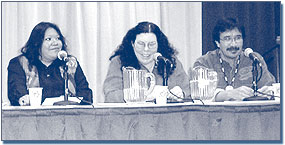
Tribes hold tot he way of their ancestors
American movies help perpetuate European stereotypes
Strength of Native culture overpowers oppression
| by Morgan Winsor Winsor Itís a five-letter, one syllable vindictive name that Native women have hated for nearly two centuries. Referred to as the "s-word," the name "squaw" is a hurtful word, offensive and degrading to Native American women, said Ruby Bernal, a Shoshone-Bannock tribal member. She said the word is another name for the genitals of women. Yet the word litters Idahoís map. More than 93 locations in the state contain the word "squaw." And tribal members throughout Idaho want the name wiped off the map entirely. Idaho tribal members are inching closer to changing eight of those place names. In April, the Idaho Geographic Place Names Advisory Council met with tribes throughout the state to discuss replacing the names. After several hours of mulling over the issue, the council motioned to accept eight Nez Perce names to replace four place names that contain "squaw," and four that contain the word "papoose." But the council only has the power to approve the names, not replace them. The names were supposed to be voted on by members of Idahoís Historical Society Board, when it met Aug. 2 in Wallace. However, Bobbi Viker, Idaho State Historical Society administrative assistant, said no discussion took place at the meeting and the recommendations from the Idaho Geographic Place Names Advisory Council were passed out to board members. Action will take place at the October 25 meeting in Boise, she said. It doesnít end there. Bernal said if approved by the society board, the U.S. Board on Geographic Names makes the final judgment. "Itís a very arduous and time consuming," Bernal said. "But it was a very positive move for the place names advisory council to accept the name changes. Itís the first time ever." Bernal said changing all 93 names that contain the "s-word" could take a while. "I think this is at least a 10-year project," she said. And sheís probably right. Twice now the state legislature has failed to pass a resolution to eliminate the word "squaw" from the stateís federal map. The first resolution was killed by one vote last year in committee. The second resolution went under the knife two months ago. Instead of voting to approve the removal of the word "squaw," the house drafted a new resolution encouraging Idahoans to suggest changing names that they think are offensive and present alternatives name changes to the State Historical Society. Many Native American women are offended that the word "squaw" was removed from the resolution altogether. |
|
||||||||
|
|||||||||
